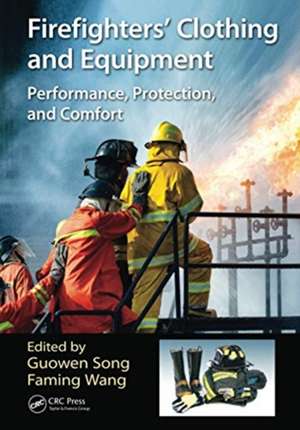Firefighters' Clothing and Equipment: Performance, Protection, and Comfort
Editat de Guowen Song, Faming Wangen Limba Engleză Paperback – 30 iun 2020
Key Features
- Presents complete overview about the requirements of firefighters' protective clothing/thermal protective materials
- Addresses performance of protection and comfort
- Includes human thermoregulation system and responses to firefighting working environment
- Discusses SMART firefighting clothing and equipment
- Suggests "how to improve the wear comfort?
| Toate formatele și edițiile | Preț | Express |
|---|---|---|
| Paperback (1) | 458.12 lei 6-8 săpt. | |
| CRC Press – 30 iun 2020 | 458.12 lei 6-8 săpt. | |
| Hardback (1) | 1189.08 lei 6-8 săpt. | |
| CRC Press – 26 noi 2018 | 1189.08 lei 6-8 săpt. |
Preț: 458.12 lei
Nou
Puncte Express: 687
Preț estimativ în valută:
87.66€ • 91.53$ • 72.39£
87.66€ • 91.53$ • 72.39£
Carte tipărită la comandă
Livrare economică 15-29 aprilie
Preluare comenzi: 021 569.72.76
Specificații
ISBN-13: 9780367570682
ISBN-10: 0367570688
Pagini: 372
Dimensiuni: 178 x 254 x 23 mm
Greutate: 0.66 kg
Ediția:1
Editura: CRC Press
Colecția CRC Press
ISBN-10: 0367570688
Pagini: 372
Dimensiuni: 178 x 254 x 23 mm
Greutate: 0.66 kg
Ediția:1
Editura: CRC Press
Colecția CRC Press
Public țintă
Professional Practice & DevelopmentCuprins
1. Textiles for Firefighting Protective Clothing. 2. Firefighters Protective Clothing and Equipment. 3 Human thermoregulation system and comfort. 5. Stored thermal energy and protective performance. 6. Functionality and Thermo physiological Comfort of Firefighter Protective Clothing: A Case Study. 7. Hot plates and thermal manikins for evaluating clothing thermal comfort. 8. Human wear trials for assessing comfort performance of firefighter protective clothing. 9. 3D body scanning technology and applications in protective clothing. 10. Instrumented Flash Fire Manikin for Maximizing Protective Clothing Performance. 11. Smart firefighting clothing. 12. Numerical modelling for heat and moisture transfer through firefighting protective clothing.
Notă biografică
Guowen Song received his PhD degree in textile engineering, chemistry and science, at College of Textiles, North Carolina State University in North Carolina, USA. Currently he is Noma Scott Lloyd Chair professor in Department of Apparel, Event and Hospitality Management, Iowa State University. Guowen’s academic interest is on textile material and clothing for human safety and health. His work involves modeling studies of textile materials, protective clothing, development of devices and test protocols and analysis of textile and clothing performance. With the existing developed facilities, his efforts are to develop a unique research program that will improve clothing function and performance. His research aims to develop new textile materials and clothing systems through understanding mechanisms and fundamentals associated with heat and mass transfer between human body, clothing and environment. These studies include application of instrumented manikins and human subjects and 3D body scanning technology. Dr. Song has published over 80 scientific papers in refereed journals and conference proceedings. He has edited several books and contributed dozen chapters in textile related books.
Faming Wang is currently an Assistant Professor in Clothing Technology at Institute of Textiles and Clothing (ITC) of The Hong Kong Polytechnic University. He earned his Lic. Phil. and Ph.D. degrees from Lund University (Sweden) under the supervision of world renowned physiologist Prof. Ingvar Holmér. After his Ph.D. training, Dr. Wang joined Eidgössische Materialprüfungs-und Forschungsanstalt (EMPA- Swiss Federal Laboratories for Materials Science and Technology, the ETH Domain, Switzerland) as Marie-Curie Fellow. He later became a Full Professor (the youngest full professor in Textiles & Clothing in the history in Mainland China) in Apparel Design & Engineering at Soochow University (Suzhou, China) in Oct. 2013 and there he established Laboratory for Clothing Physiology and Ergonomics (LCPE), a multi-disciplinary research group for the study of thermal interaction of the human body-clothing-environment system. To date, he has authored and co-authored >200 journal publications, conference papers/presentations, technical reports, books/chapters and patents. His published work has been cited >1,000 times and this gave him an h-index of 19 (Google Scholar, as of April 2018). In addition, he serves as the editorial member for several journals including Journal of Thermal Biology (a JCR-Q1 journal). He is also a founder member of Asian Society of Protective Clothing (ASPC).
Faming Wang is currently an Assistant Professor in Clothing Technology at Institute of Textiles and Clothing (ITC) of The Hong Kong Polytechnic University. He earned his Lic. Phil. and Ph.D. degrees from Lund University (Sweden) under the supervision of world renowned physiologist Prof. Ingvar Holmér. After his Ph.D. training, Dr. Wang joined Eidgössische Materialprüfungs-und Forschungsanstalt (EMPA- Swiss Federal Laboratories for Materials Science and Technology, the ETH Domain, Switzerland) as Marie-Curie Fellow. He later became a Full Professor (the youngest full professor in Textiles & Clothing in the history in Mainland China) in Apparel Design & Engineering at Soochow University (Suzhou, China) in Oct. 2013 and there he established Laboratory for Clothing Physiology and Ergonomics (LCPE), a multi-disciplinary research group for the study of thermal interaction of the human body-clothing-environment system. To date, he has authored and co-authored >200 journal publications, conference papers/presentations, technical reports, books/chapters and patents. His published work has been cited >1,000 times and this gave him an h-index of 19 (Google Scholar, as of April 2018). In addition, he serves as the editorial member for several journals including Journal of Thermal Biology (a JCR-Q1 journal). He is also a founder member of Asian Society of Protective Clothing (ASPC).
Descriere
This book describes an in-depth review of firefighting clothing and equipment, and explicitly addresses the performance of protection and comfort in textile engineering, clothing design, and evaluation. Covered topics include protection and comfort requirements, testing methods, standards and performance evaluation etc.
